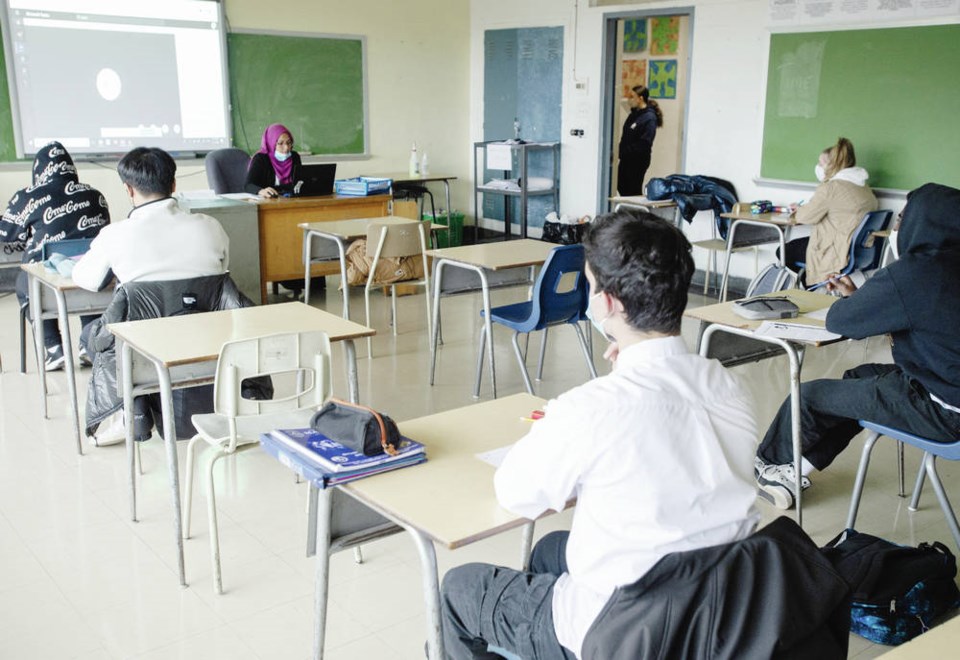How are Canadian students performing in the strategically important subject of mathematics?
The answer to the question depends largely on three important factors: who you ask, what exactly you are asking about and the assumptions behind the question.
In other words, any useful answer depends on the measures consulted and the standards against which results are compared.
If you are looking for a credible but simple answer to the “how are Canadian math students doing” question, you could stop reading now.
They are doing fine.
Overall, Canadian math scores remained significantly higher than the OECD (Organization for Economic Co-operation and Development) average over the 2003-2018 period.
How do we know this?
Because the results from the Programme for International Student Assessment (PISA) say so.
Conducted every three years among 15-year old students, PISA is considered the most extensive and widely accepted measure of academic math proficiency among lower secondary school students around the world.
Even at that, your interpretation of PISA math results will depend partly on how proficient you are at dealing with logical inferences drawn from both the top and bottom of the statistical deck.
People seeking to demonstrate that standards are in decline point out that while Canada had the fifth-highest score among the 37 countries participating in 2003, it occupied 12th place among 78 participating jurisdictions in the most recent assessment, in 2018.
Does that represent a decline? Normally, we’d need to be cautious about drawing any conclusions from comparisons drawn from two very different samples, different tests conducted years apart.
Even so, Canada had the second-highest 2018 math score among G7 countries after Japan, and Canadian math scores have remained significantly higher than the OECD average over the 15-year period from 2003 to 2018.
Of more significance to Canadian math educators and even headline-loving politicians would be the results drawn from the Pan-Canadian Assessment of Science, Reading and Mathematics (PCAP), our only national achievement measure.
PCAP assessments are performed on samples of Grade 8 students every three years. Over the 2010 to 2016 period, math scores improved in all provinces except Ontario, where they were flat.
Results from the Pan-Canadian assessments show increasing math scores in all provinces except Ontario and Saskatchewan, but with a similar pattern of relative performance across the other provinces.
Interestingly, Quebec consistently outperforms all other provinces on all available comparative measures.
Ontario and Alberta occupy second and third place respectively.
The differences in score trends are likely attributable to the fact that the provinces measure math performance against their own curriculum standards, not the assumptions underlying the international PISA assessment.
However, a 2018 article by Paul W. Bennett, Ed.D, author of The State of the System: A reality check on Canada’s schools, identified five major factors that may offer some insight as to why Quebec students continue to lead the pack in pan-Canadian mathematics achievement.
Firstly, says Bennett, Quebec has a clearer curriculum philosophy and sequence that demonstrates an acceptance of the need for integration and progression of skills.
“The way math is presented makes the difference,” says Genevieve Boulet, a mathematics-education professor at Mount St. Vincent University.
Secondly, experts agree that Quebec has a superior math curriculum. Fewer topics tend to be covered at each grade level, but they’re covered in more depth than in B.C. and other Canadian provinces.
Thirdly, in Quebec faculties of education, prospective elementary school math teachers must take as many as 225 hours of university courses in math education. In other provinces, they receive as little as 39 hours.
Fourth, as Annie Savard, a McGill University education professor, points out, Quebec teachers have a clearer understanding of “didactic” instruction, a concept championed in France and French-speaking countries. “Knowing the content of the course isn’t enough,” Savard says. “You need what we call didactic [teaching]. You need to unpack the content to make it accessible to students.”
Lastly, students in Quebec still write provincial examinations, and achieving a pass in mathematics is a requirement to secure a graduation (Secondaire V) diploma.
Many B.C. math teachers would love to see provincial exams brought back. They consider that the broader competency involved in writing an important provincial exam provides a background to the proficiencies, processes and skills needed in any math-related activities in later life, from staying financially solvent to deciding when to trade in your car.
For all of that, neither PISA nor PCAP assessments adequately capture what Einstein described as the key to his own mathematical success: “It’s not that I’m so smart, it’s just that I stay with problems longer.”
Geoff Johnson is a former Superintendent of Schools. [email protected]



